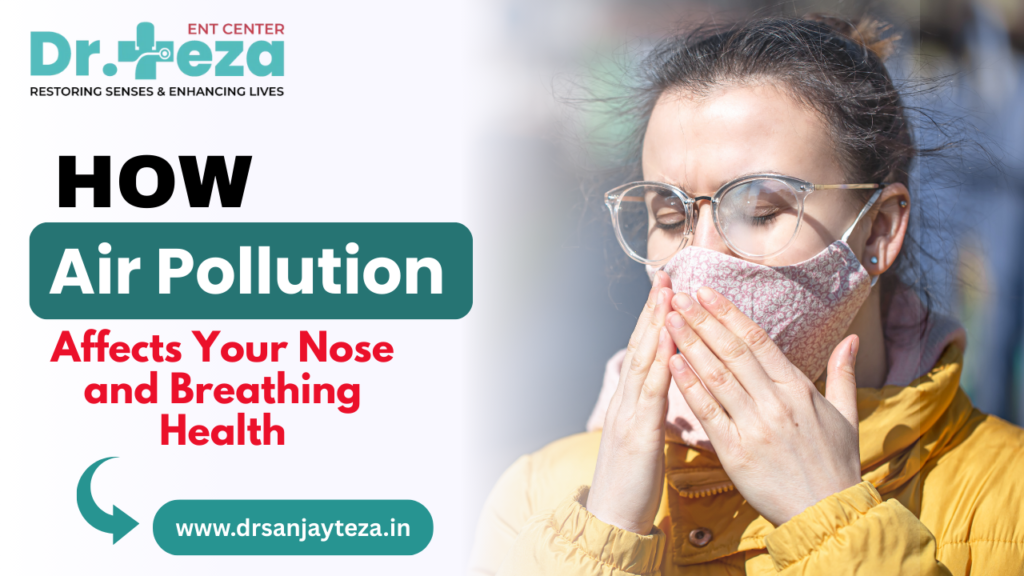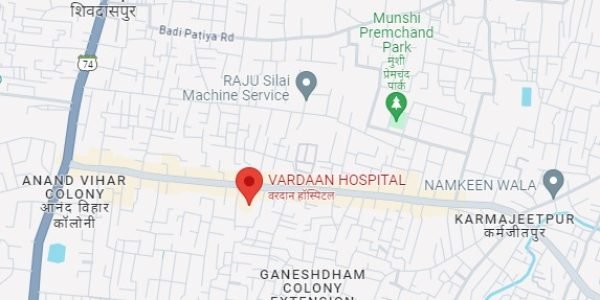
How Air Pollution Affects Your Nose and Breathing Health? Air pollution has become one of the most significant health concerns in modern times, particularly in urban cities like Varanasi. With rising vehicular emissions, industrial pollutants, construction dust, and seasonal smog, the air we breathe is no longer as safe as it should be. The nose, being the primary gateway for inhaling air, is the first organ to face the impact of air pollution. Dr. Sanjay Teza, a leading ENT specialist in Varanasi, explains how polluted air affects your nasal health, breathing patterns, and overall respiratory well-being.
In this blog, we will explore the effects of air pollution on the nose, throat, and lungs, as well as preventive measures and when to consult an ENT doctor for treatment.
Understanding Air Pollution and Its Components
Air pollution is a mixture of harmful gases, chemicals, and particulate matter. The major pollutants that affect nasal and respiratory health include:
- Particulate Matter (PM2.5 & PM10): Fine dust particles that enter deep into the respiratory tract.
- Carbon Monoxide (CO): A poisonous gas from vehicles and industrial emissions.
- Sulfur Dioxide (SO2) & Nitrogen Dioxide (NO2): Byproducts of burning fuels that irritate the airways.
- Ozone (O3): Found in smog, which inflames the respiratory system.
- Volatile Organic Compounds (VOCs): Released from paints, fuels, and chemicals.
Varanasi, being a densely populated and spiritual city, often experiences increased pollution levels due to traffic congestion, burning of biomass, and seasonal stubble burning from nearby regions.
How Air Pollution Affects the Nose
The nose is the first line of defense against polluted air. Its function is to filter, warm, and humidify the air before it enters the lungs. However, exposure to pollutants reduces its efficiency and leads to several nasal conditions:
- Nasal Congestion: Polluted air irritates the nasal passages, causing swelling and blockage.
- Allergic Rhinitis: Dust, smoke, and chemicals trigger sneezing, a runny nose, and itching.
- Sinus Infections: Pollutants weaken immunity, making the sinuses prone to bacterial and viral infections.
- Reduced Sense of Smell: Long-term exposure damages the olfactory nerves.
- Dryness and Irritation: Polluted air dries out the nasal lining, causing discomfort and frequent nosebleeds.
Impact of Air Pollution on Breathing and Respiratory Health
Breathing polluted air affects not just the nose, but the entire respiratory system, including the throat and lungs. Dr. Sanjay Teza emphasizes that children, elderly people, and those with pre-existing respiratory conditions are at higher risk.
Common Breathing Problems Caused by Air Pollution:
- Chronic Cough and Throat Irritation: Pollutants cause persistent coughing and throat dryness.
- Asthma Attacks: Polluted air triggers or worsens asthma symptoms.
- Bronchitis: Long-term exposure causes inflammation of the airways.
- Sleep Disturbances: Nasal congestion and difficulty in breathing disturb sleep quality.
- Long-Term Risks: Prolonged exposure increases the chances of Chronic Obstructive Pulmonary Disease (COPD) and even lung cancer.
Why Air Pollution Is Worse for City Dwellers in Varanasi
Varanasi is one of the most densely populated cities in Uttar Pradesh. The constant inflow of pilgrims, heavy traffic, industrial emissions, and burning of incense and biomass add to the rising air pollution levels. Seasonal changes, such as winter smog, further worsen the air quality.
This makes it even more important for people in Varanasi to take preventive steps to protect their nasal and breathing health.
Tips to Protect Your Nose and Breathing Health
Dr. Sanjay Teza, a trusted ENT doctor in Varanasi, recommends the following preventive measures:
- Use Masks: Wear N95 masks while traveling outdoors to filter fine particles.
- Keep Indoor Air Clean: Use air purifiers, avoid smoking indoors, and maintain proper ventilation.
- Stay Hydrated: Drinking enough water keeps the nasal lining moist and prevents dryness.
- Nasal Irrigation: Rinsing your nose with saline water clears pollutants and allergens.
- Steam Inhalation: Helps clear nasal congestion and soothe irritated airways.
- Avoid Outdoor Activities During High Pollution: Early mornings and evenings often have poor air quality; limit exposure during these times.
- Boost Immunity: Eat a balanced diet rich in antioxidants to fight the harmful effects of pollution.
- Regular ENT Checkups: If symptoms persist, visit a specialist to avoid complications.
When to See an ENT Specialist in Varanasi
Ignoring symptoms caused by air pollution can lead to long-term respiratory problems. Dr. Sanjay Teza suggests consulting an ENT specialist if you experience:
- Constant sneezing, nasal congestion, or a runny nose
- Frequent sinus infections
- Loss of smell or taste
- Chronic sore throat and cough
- Difficulty in breathing or wheezing
- Persistent headaches caused by sinus issues
Early diagnosis and treatment can prevent complications and improve your breathing health.
Treatments for Pollution-Related ENT Problems
At his ENT center in Varanasi, Dr. Sanjay Teza provides advanced treatments for nasal and respiratory issues caused by air pollution:
- Allergy Management: Medicines and lifestyle changes to control allergic rhinitis.
- Sinusitis Treatment: Antibiotics, nasal sprays, and, in severe cases, sinus surgery.
- Endoscopic Examinations: To identify blockages or structural problems in the nose.
- Throat & Voice Disorders: Treatment for chronic cough, throat irritation, and voice issues.
- Preventive Care: Advice on lifestyle changes to reduce pollution impact.
Role of ENT Specialists in Managing Air Pollution-Related Illnesses
ENT specialists like Dr. Sanjay Teza play a crucial role in:
- Identifying the root cause of nasal and respiratory issues.
- Providing personalized treatment plans.
- Offering surgical and non-surgical solutions for chronic problems.
- Educating patients about preventive care.
Book your Appointment Today
- Visit our GMB profile: Dr. Sanjay Teza ENT Center
- Address:
✅ वरदान हॉस्पिटल, सुंदरपुर, वाराणसी | 10AM–2PM
✅ शाकम्भरी काम्प्लेक्स, भेलूपुर, वाराणसी | 5PM – 7PM - Phone: 093369 22349
- Website: https://drsanjayteza.in/
- Follow us on 👉: Facebook & Instagram
Conclusion
Air pollution is a silent but dangerous threat to nasal and respiratory health. From allergies and sinus infections to chronic respiratory diseases, its impact is far-reaching. Protecting yourself with preventive measures and consulting an experienced ENT specialist in Varanasi, like Dr. Sanjay Teza, can help you breathe easier and live a healthier life.
Frequently Asked Questions
Q1. Can air pollution cause permanent damage to the nose and lungs?
Yes, long-term exposure can lead to chronic sinusitis, reduced sense of smell, asthma, COPD, and even increase the risk of lung cancer.
Q2. How can I protect my nose from air pollution in Varanasi?
Wearing N95 masks, using saline nasal sprays, steam inhalation, and keeping indoor air clean can significantly reduce nasal irritation.
Q3. When should I visit an ENT specialist?
If you experience persistent nasal congestion, chronic cough, frequent throat infections, or breathing difficulties, consult an ENT doctor immediately.
Q4. Are children more vulnerable to polluted air?
Yes, children have developing lungs and weaker immunity, making them more sensitive to pollution effects.
Q5. Can nasal irrigation really help against pollution?
Yes, rinsing the nasal passages with saline solution helps clear dust, allergens, and pollutants, reducing irritation and infection risks.
Q6. Is indoor air safer than outdoor air?
Not always. Indoor air can also be polluted due to smoke, dust, and poor ventilation. Using air purifiers and keeping homes dust-free is essential.
Q7. What role does diet play in protecting against pollution?
A diet rich in antioxidants (fruits, vegetables, nuts) strengthens the immune system and reduces the harmful effects of free radicals caused by pollution.

